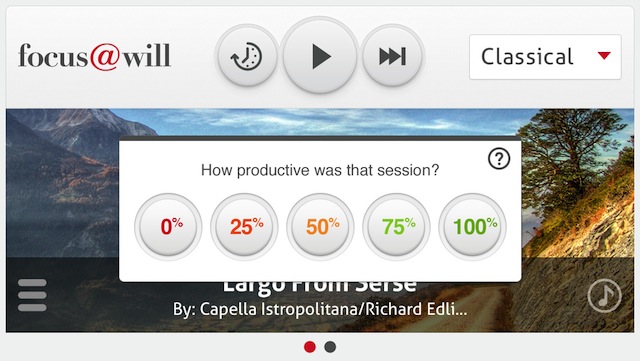I’ve always been impressed by people who can listen to music while they write. I mean, I’ll do it every once in a while, especially when one of my co-workers is being particularly distracting, but in general I’ve found that music just slows me down.
Well, there’a startup called focus@will aiming to solve that problem, and today it’s following the launch of its website and Android app with the release of an app for iOS.
Founder and CEO Will Henshall seems uniquely positioned to work on something like this. He founded music tech company Rocket Network and also created the audio media transfer system DigiDelivery, which he sold to Avid/Digidesign in 2003. But he’s also a professional musician and songwriter, having been one of the founding members of the band Londonbeat and one of the writers on their hit songs “I’ve Been Thinking About You” and “Come Back.”
Henshall told me that most music is designed to delight and distract you — those are worthy goals, but they’re not exactly the best combination when it comes to productivity. Focus@will, on the other hand, has licensed tracks that were chosen specifically to not distract you, and in fact to help you focus. That means no tracks with vocals, saxophones, or other things that focus@will has tested and found distracting. Henshall said that’s not quite the same thing as just playing elevator music, which people have learned how to ignore entirely. Here’s a little more info on how it works from the focus@will website:
The focus@will system makes it easier for you to get into the concentration flow, and then keeps you there. It works in the background by subtly soothing the part of your brain, the limbic system, that is always on the lookout for danger, food, sex or shiny things. …
Each piece of music phase sequenced by focus@will has a specific role in influencing how your brain habituates, enhancing your focus and reading enjoyment. Characteristics such as musical key, intensity, arrangement, speed, emotional values, recording style, and much more determine what is played where and when.
If you’re a little dubious about the science, there’s more detail and more citations on the site. For what it’s worth, I’ve been listening to focus@will while I work this morning, and while I haven’t noticed a dramatic increase in productivity or anything, I do feel like I think I went a solid hour without getting distracted, which is kind of a miracle.
When you’re listening to the app, you can choose from different channels like Cinematic, Ambient, and Classical. You can also skip songs, which will give the app more information about what works and doesn’t work for you. There’s no advertising. Instead, there’s a three-week free trial period — after that, you can only listen for 100 minutes at a time or you have to pay a subscription fee of $3.99 per month for unlimited access.
As for the iPhone app, Henshall said it’s pretty similar to the web and Android versions, except that it has been optimized for iOS hardware and supports both portrait and landscape mode, plus it uses digital signal processing so that the audio settings get automatically adjusted based on what’s playing.
I also asked whether Henshall had any trepidation about putting his name on the company, and he replied, “I’ve gotta tell you, it wasn’t my idea. I didn’t want to be that guy, you know?” However, he realized that “being able to focus at will, being able to control your own life” is the key to the company’s vision.
Focus@will is backed by the Pritzker Foundation and Singularity University.
